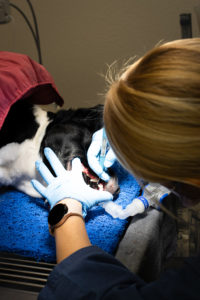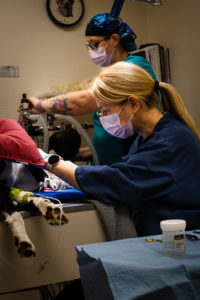Signs of oral/dental disease
-bad breath
-salivation/drooling
-reluctance to eat
-difficulty chewing
-discharge from nose
-sneezing
-weight loss
-facial swelling
-visibly loose teeth
-tartar on the teeth
-red and inflammed gums
-dropping food from mouth
-reluctance to play with toys
-won’t let you touch their face/head
At Animal Clinic in Sussex, we thoroughly inspect your pet’s oral cavity at every examination. Periodontal disease is a very common issue that we encounter in patient’s of all ages. According to the American Veterinary Dental Society (AVDS) an astounding 80% of dogs and 70% of cats show signs of oral disease by age 3. It is a frequently forgotten area of overall health and can cause systemic problems. The bacteria from oral disease can spread through the body and cause infections and potentially irreversible heart, liver and kidney problems. In addition to the health risks of periodontal disease, the inflammation, infection and subsequent bone loss can be very painful. The bone loss of advanced periodontal disease is irreversible and oftentimes leads to eventual tooth loss. With routine preventive dental care, we aim to prevent extractions.
Our dental procedure is performed with your pet under general anesthesia. They are administered pain and/or sedation medications to reduce any discomfort and anxiety they may experience. A certified veterinary technician (CVT) will first obtain full mouth digital dental x-rays which the doctor will evaluate/review to look for any signs of oral disease. The CVT will perform an ultrasonic scaling and the teeth are polished with a prophy paste to smooth the surface and prevent bacteria from reattaching.
If extractions are necessary we will first administer a local anesthetic nerve block. This will reduce the amount of anesthesia that your pet will need and allow them to be free of pain when they recover. We perform surgical extractions and utilize our high speed drill to reduce trauma. This allows your pet to have the least amount of discomfort and have the quickest recovery. Pain medications are repeated post-procedure if necessary and are also dispensed to be administered orally if indicated.
We are dedicated to maintaining your pet’s comfort and longevity. We will educate you on home dental care and give you tips to make teeth brushing at home successful. We will help you to try to recognize signs of oral disease.


